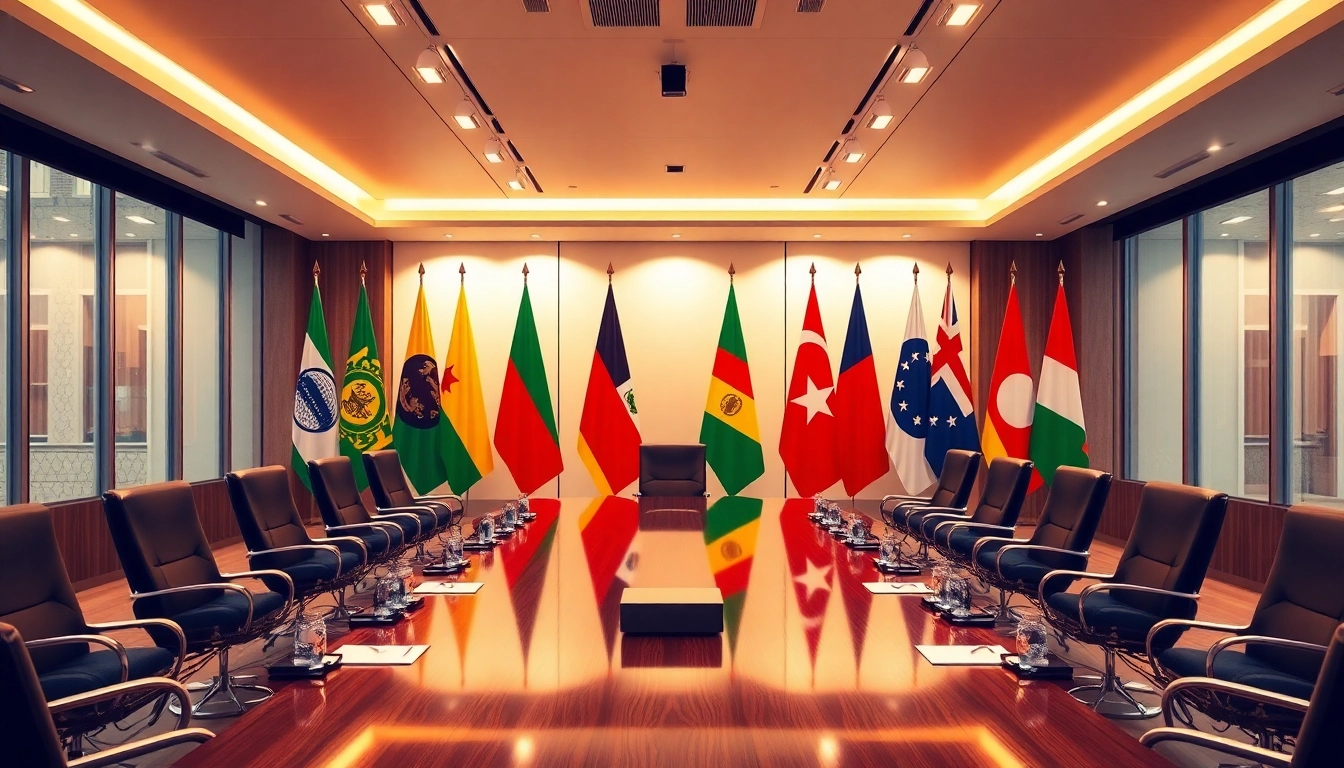
Understanding the BRICS Africa Partnership
The BRICS Africa partnership represents a significant shift in the geopolitical landscape, marking a collective effort by emerging economies to redefine their roles in the global arena. As African nations increasingly engage with the BRICS coalition—including Brazil, Russia, India, China, and South Africa—opportunities for collaboration and growth abound. This partnership is not merely an extension of foreign aid; it embraces a more holistic approach centered on mutual respect, shared interests, and a commitment to sustainable development. For insightful details about how this partnership is evolving, you can explore more about the BRICS Africa partnership.
Historical Context and Formation
The roots of the BRICS alliance can be traced back to various economic and political aspirations dating back several decades. Initially formed as a response to Western-dominated economic systems, BRICS serves as a platform for these emerging economies to share resources, expertise, and markets. The inclusion of African nations into this alliance signifies a broader recognition of Africa’s contributions to globalized trade and economic resilience. Historical events, such as the end of colonialism and the rise of independence movements across African countries, laid the groundwork for the current collaboration, fostering a spirit of solidarity and cooperation among BRICS nations.
Key Players and Their Roles
In the BRICS Africa partnership, several nations stand out as pivotal players. Each country brings unique strengths and resources to the table:
- South Africa: As the gateway to Africa, South Africa plays a critical role in facilitating access and fostering relationships within the continent.
- Russia: With its vast energy resources and technological expertise, Russia’s contributions significantly enhance food security and energy cooperation.
- China: China is a major investor in Africa, focusing on infrastructure development, which has helped improve trade facilitates and economic growth.
- Brazil: Brazil’s agricultural expertise provides valuable insights and resources for enhancing food production and sustainability in Africa.
- India: India’s emphasis on technology and education initiatives supports capacity building and knowledge transfer across African nations.
Objectives of Collaboration
The primary objectives of the BRICS Africa partnership include fostering economic growth, enhancing trade relationships, and addressing common challenges. By pooling resources, these nations aim to:
- Expand trade routes and networks to facilitate faster and more efficient commerce.
- Encourage foreign direct investment through favorable policies and partnerships.
- Jointly tackle issues such as climate change, health crises, and food security, utilizing innovative solutions.
The Economic Implications of BRICS Africa Partnership
Trade Opportunities and Challenges
The BRICS Africa partnership opens new avenues for trade opportunities, allowing African nations to position themselves as essential links between emerging markets. However, challenges such as trade barriers, tariffs, and currency fluctuations can complicate these efforts. Effective strategies need to be implemented, including:
- Establishing free-trade agreements that lower tariffs and simplify cross-border transactions.
- Promoting local industries and SMEs to enhance competitiveness in global markets.
- Engaging in dialogue to address and resolve trade disputes amicably.
Foreign Investment Growth
Foreign investment is vital for economic development and sustainability. The BRICS partnership emphasizes attracting investment into key sectors such as agriculture, technology, and infrastructure. Studies have shown that investment resulting from collaborative initiatives has led to significant growth. Successful case studies highlight:
- Joint ventures in renewable energy that have created jobs and fostered technological exchanges between countries.
- Investments in agricultural technology resulting in increased production yields for several African nations.
Impact on Local Economies
The impact of the BRICS Africa partnership on local economies is multi-faceted. It can lead to job creation, improved standards of living, and greater economic resilience. However, the challenge remains to ensure that such benefits are equitably distributed among all populations. Local governments need to:
- Implement policies that protect vulnerable communities against adverse effects of foreign investment.
- Encourage local entrepreneurship alongside foreign partnerships.
- Promote sustainable development initiatives that align with community needs and aspirations.
Social and Cultural Exchanges
Education and Knowledge Sharing Initiatives
Education plays a critical role in fostering understanding and cooperation among BRICS partners. Several education-focused initiatives have emerged, aimed at facilitating knowledge sharing. Scholarships and exchange programs create pathways for students from BRICS nations to study and experience different cultures while gaining valuable skills. Moreover, partnerships between universities and research institutions help boost innovation by:
- Encouraging joint research projects that address regional and global challenges.
- Facilitating academic exchanges to enhance educational methodologies and curricula.
Promoting Tourism and Cultural Understanding
The tourism sector is another avenue through which social and cultural exchanges thrive. By promoting tourism among BRICS nations, cultural understanding deepens, leading to stronger ties. Strategies to enhance this aspect include:
- Co-marketing campaigns to promote tourism opportunities across member nations.
- Hosting cultural festivals and events that celebrate diversity and promote mutual respect.
Collaboration in Arts and Innovation
Artistic collaborations among BRICS countries enhance creativity and cultural exchange. Projects focusing on visual arts, music, and performance create platforms for artists to share unique perspectives and interpretations. Moreover, innovation hubs established within BRICS countries support:
- Creative industries by providing resources and networks for artists and entrepreneurs.
- Cross-cultural art exchanges that challenge stereotypes and encourage dialogue.
Addressing Global Challenges
Climate Change and Environmental Sustainability
Climate change poses significant challenges worldwide, and BRICS nations recognize their shared responsibility in combating this crisis. The partnership focuses on collaborative efforts to develop sustainable practices by:
- Investing in renewable energy projects and green technologies that reduce environmental footprints.
- Coordinating policy frameworks that address emissions and promote conservation.
Health and Pandemic Response Strategies
The COVID-19 pandemic exemplified the importance of global cooperation in tackling health emergencies. The BRICS Africa partnership aims to strengthen health systems through joint initiatives, such as:
- Sharing research data and resources to support vaccine development and distribution.
- Implementing disease surveillance and response networks among member nations.
Food Security and Agricultural Development
Food security remains a pressing issue across many regions in Africa. Collaboration among BRICS countries focuses on improving agricultural development through initiatives that capitalize on shared knowledge, including:
- Research collaborations to develop climate-resilient crop varieties.
- Resource sharing to enhance sustainable farming practices.
Future of the BRICS Africa Partnership
Projecting Growth and Success
As the global power dynamics continue to shift, the BRICS Africa partnership is poised for growth. With an increasing number of countries expressing interest in joining the alliance, the potential for expansion provides opportunities for deeper engagements. Strategic planning will be vital to ensure that growth translates into tangible benefits for all member nations.
Potential Areas for Expansion
Future collaborations may focus on critical domains such as technology transfer, infrastructure development, and enhanced trade agreements. Areas ripe for expansion include:
- Expanding digital infrastructure to support e-commerce and remote work.
- Developing regional transport networks that improve connectivity among partner nations.
Visitors’ View: Perceptions and Reactions
The public perception of the BRICS Africa partnership varies among individuals and sectors. Education about the potential benefits, combined with transparent communication strategies, can pave the way for positive receptions and increased community engagement. Listening to the concerns and aspirations of local populations is crucial for fostering a supportive environment.





